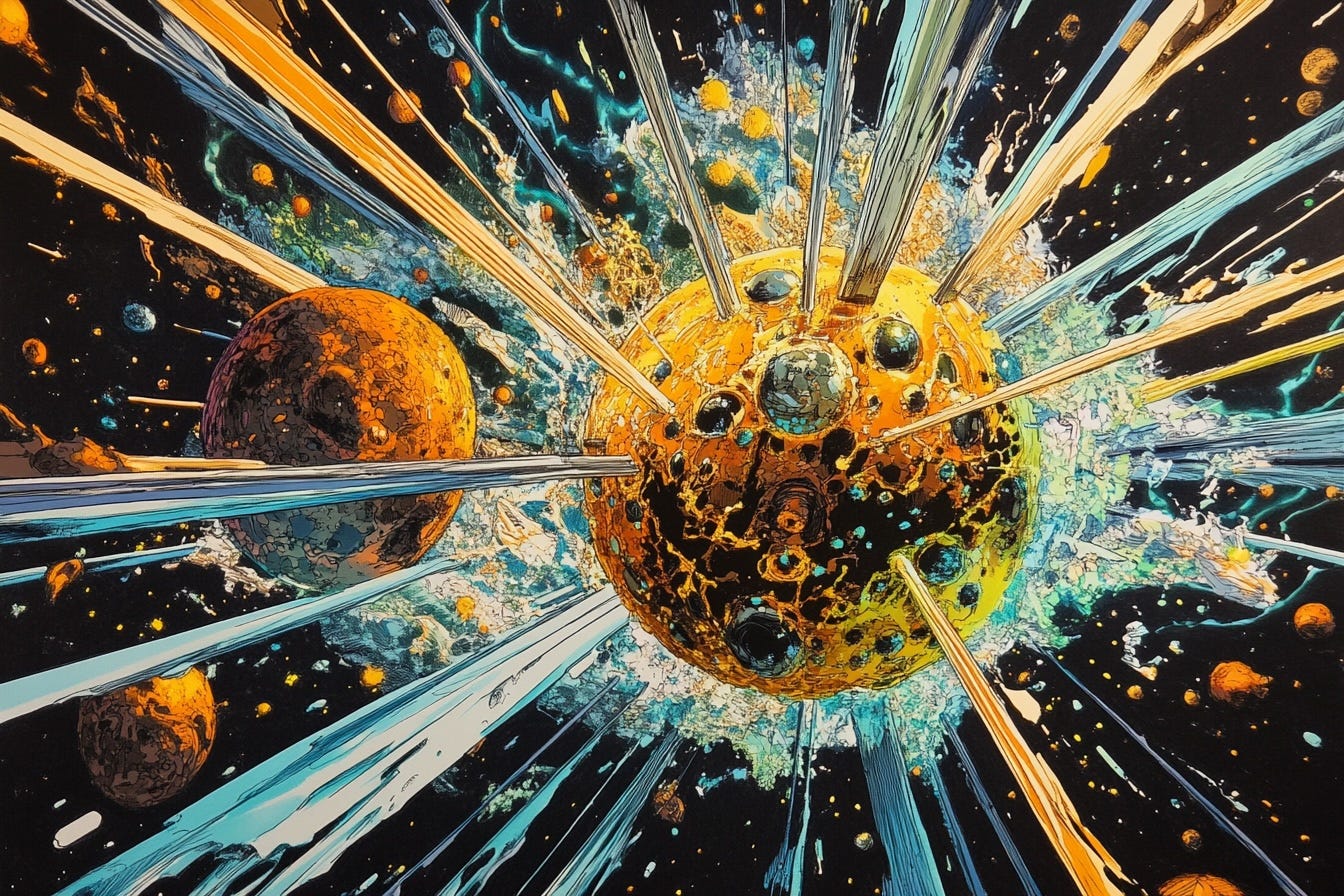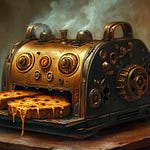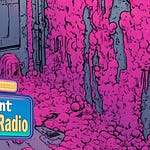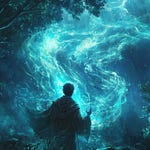Today, in the spirit of the Hitchhiker's Guide to the Galaxy, we are diving into the Higgs boson - a particle so improbable that it just might be the key to everything.
Don't Panic, It's Just the Fabric of Reality
In the vast expanse of our universe, amidst swirling galaxies and cosmic phenomena, lies a particle so fundamental yet elusive that it took nearly half a century to confirm its existence. This is the story of the Higgs boson, often dramatically dubbed "the God particle" - a name that makes many scientists, including its namesake Peter Higgs, cringe. But what exactly is this particle, and why has it captured the imagination of scientists and storytellers alike?
To explore this question, we're going to take a journey through the cosmos that would make Douglas Adams proud. Just as Adams' iconic "The Hitchhiker's Guide to the Galaxy" provided a whimsical tour of the universe, we're going to embark on a tour of the subatomic world, with the Higgs boson as our guide.
So grab your towel, and don't panic - we're about to dive into the fundamental fabric of reality.
The Higgs bosun
The Higgs boson is not just another subatomic particle. It's the key to understanding how the universe as we know it came to be. Its discovery in 2012 marked a triumph of human ingenuity and perseverance, confirming theories first proposed in the 1960s and completing the Standard Model of particle physics - our current best understanding of how the universe works at its most fundamental level. You might say it's the "42" of particle physics - an answer that leads to even more intriguing questions.
For science fiction and fantasy authors, the Higgs boson offers a wealth of inspiration, much like Adams found inspiration in the quirks of our universe for his satirical space opera. It's a portal to exploring themes of creation, existence, and the nature of reality itself. But to harness its potential in your stories, it's crucial to understand what the Higgs boson is, how it was discovered, and why it matters.
So, in the spirit of the Hitchhiker's Guide, let's explore the Higgs boson - a particle so improbable that it just might be the key to everything.
The Cosmic Cocktail Party: Understanding the Higgs Field
Imagine the universe as an endless cocktail party. The Higgs field is like an invisible crowd filling every inch of space. Some particles, like photons (particles of light), zip through this crowd unimpeded - they have no mass. Others, like electrons and quarks, interact with the crowd, making it harder for them to move - this interaction gives them mass.
The Higgs boson? It's like a visible ripple in this cosmic crowd, a detectable manifestation of the Higgs field. When we observe a Higgs boson, we're essentially seeing a quantum excitation of the Higgs field, much like a wave on the surface of an ocean.
This mechanism solves a fundamental problem in physics: why do some particles have mass while others don't? Without the Higgs field:
Electrons would be massless and wouldn't orbit atomic nuclei
Atoms couldn't form
Stars wouldn't shine
Planets wouldn't exist
Life as we know it would be impossible
The Higgs mechanism is what allows the universe to have structure rather than being a soup of massless particles moving at the speed of light.
The Man Behind the Boson: Peter Higgs
Every great discovery has a human story behind it, and the Higgs boson is no exception. Peter Ware Higgs (1929-2024) was a British theoretical physicist whose work revolutionized our understanding of the universe.
Born in Newcastle upon Tyne, England, Higgs showed an early aptitude for science. He pursued his passion at King's College, London, earning his bachelor's, master's, and doctoral degrees in physics. Higgs spent most of his career at the University of Edinburgh, where he developed his groundbreaking theory.
In 1964, Higgs proposed the existence of a field (later named the Higgs field) that gives particles mass. This theory also predicted the existence of a new particle - the Higgs boson. Interestingly, when Higgs first submitted his theory for publication, it was rejected as being "of no obvious relevance to physics". This initial setback didn't deter him, and his revised paper became one of the most important in modern physics.
Higgs' work went unconfirmed for nearly half a century. In 2012, scientists at CERN's Large Hadron Collider finally detected the Higgs boson, confirming his theory. For his contributions, Higgs was awarded the 2013 Nobel Prize in Physics, shared with François Englert.
Peter Higgs passed away on April 8, 2024, leaving behind a legacy that fundamentally changed our understanding of the universe.
The Hunt for the Higgs: A Triumph of Big Science
The search for the Higgs boson was one of the most ambitious scientific endeavours in human history. It required the construction of the Large Hadron Collider (LHC), the largest and most powerful particle accelerator ever built.
Located at CERN near Geneva, Switzerland, the LHC is a 27-kilometer ring of superconducting magnets. Inside this ring, beams of particles are accelerated to nearly the speed of light and made to collide. These collisions recreate conditions similar to those just after the Big Bang, allowing scientists to observe exotic particles like the Higgs boson.
The discovery of the Higgs boson was announced on July 4, 2012, based on data from the ATLAS and CMS experiments at the LHC. This marked the end of a decades-long search and the beginning of a new era in particle physics.
Beyond the Standard Model: New Frontiers
While the discovery of the Higgs boson completed the Standard Model of particle physics, it also opened up new questions and research directions:
1. Multiple Higgs Bosons: Some theories suggest there might be multiple types of Higgs bosons. The search for these hypothetical particles continues.
2. Dark Matter Connection: The Higgs boson might provide insights into dark matter, the mysterious substance that makes up about 85% of the matter in the universe. Some theories propose that dark matter particles could interact with the Higgs boson.
3. Universe Stability: The mass of the Higgs boson has implications for calculations about the long-term stability of the universe. Some models suggest our universe might be in a metastable state, which could have profound implications for its future.
4. Rare Decay Modes: In May 2023, CERN announced evidence of a rare decay process for the Higgs boson, where it decays into a Z boson and a photon. This decay mode occurs in only about 0.15% of Higgs boson decays according to Standard Model predictions, but the measured rate was higher than expected. This could hint at new physics beyond the Standard Model.
The Higgs Boson Through the Lens of "The Hitchhiker's Guide to the Galaxy"
Douglas Adams' iconic science fiction series "The Hitchhiker's Guide to the Galaxy" is renowned for its absurdist take on the universe and its fundamental workings. While Adams didn't explicitly discuss the Higgs boson (the first book was published in 1979, long before the particle's discovery), his unique perspective on cosmic mysteries provides an entertaining lens through which we can view this fundamental particle.
The Ultimate Answer to Life, the Universe, and Everything
In "The Hitchhiker's Guide," a supercomputer named Deep Thought calculates that the answer to the ultimate question of life, the universe, and everything is 42. This absurdist answer parallels the complex and often counterintuitive nature of particle physics. The Higgs boson, like the number 42, is in many ways an answer that prompts more questions. It solves the mystery of how particles acquire mass but opens up new inquiries about the nature of the universe.
The Infinite Improbability Drive
Adams' Infinite Improbability Drive, which allows the spaceship Heart of Gold to pass through every conceivable point in every Universe simultaneously, could be seen as a whimsical parallel to the Higgs field. Just as the Drive allows for seemingly impossible feats of transportation, the Higgs field allows for the seemingly impossible feat of giving mass to fundamental particles.
Bistromathics and the Fundamental Interconnectedness of All Things
In the Hitchhiker's series, Adams introduces the concept of Bistromathics, a branch of mathematics based on the chaotic behaviour of numbers in restaurants. This playful idea reflects the often-counterintuitive nature of quantum physics, where particles can exist in multiple states simultaneously and affect each other instantly across vast distances. The Higgs boson, as the physical manifestation of the Higgs field that permeates all of space, embodies this idea of the fundamental interconnectedness of all things.
The Guide Itself: A Repository of All Knowledge
The eponymous Hitchhiker's Guide to the Galaxy, an electronic book containing all the knowledge in the universe (much of it inaccurate), could be seen as a metaphor for the Standard Model of particle physics. Just as the Guide attempts to explain everything in the galaxy, the Standard Model attempts to explain all known fundamental particles and forces. The discovery of the Higgs boson was the final piece that completed this "guide" to the subatomic world.
Don't Panic: A Message for Particle Physicists
The calming message "Don't Panic" emblazoned on the cover of the Hitchhiker's Guide could well apply to the world of particle physics. The search for the Higgs boson took nearly 50 years from its theoretical prediction to its experimental discovery. This long journey required patience, persistence, and a refusal to panic in the face of repeated null results.
Inspiration for Storytellers
For authors, the Higgs boson offers a rich vein of inspiration:
1. Creation Myths: The Higgs field's role in giving particles mass could be reimagined as a magical field that gives substance to reality, similar to how Adams' Infinite Improbability Drive allows for impossible feats.
2. Parallel Universes: Theories about multiple Higgs bosons could inspire stories about parallel universes with different fundamental laws of physics, perhaps accessible through a device like the Infinite Improbability Drive.
3. Reality Manipulation: The idea that the Higgs field permeates all of space could lead to stories where characters learn to manipulate this field, altering the properties of matter - a concept that could be explored with the whimsy of Bistromathics.
4. Cosmic Mysteries: The connection between the Higgs boson and dark matter could inspire stories about hidden aspects of the universe waiting to be discovered, much like the revelations in "The Hitchhiker's Guide to the Galaxy".
5. Existential Threats: Calculations about universe stability based on the Higgs boson's properties could fuel apocalyptic scenarios or stories about the far future of the cosmos, perhaps with the humorous twist of a supercomputer giving a seemingly nonsensical answer like "42".
6. The Ultimate Guide: Create a fictional guide to the universe, inspired by Adams' Hitchhiker's Guide, that attempts to explain fundamental particles and forces in humorous and accessible ways.
Beyond The Hitchhiker's Guide
Beyond The Hitchhikers Guide, the Higgs boson has captured the imagination of writers across science fiction and fantasy. Here are some notable examples:
1. Flashforward by Robert J. Sawyer: This novel features a particle physics experiment that causes the entire human race to see a vision of the future. While not explicitly mentioning the Higgs boson, the book draws inspiration from real particle physics experiments.
2. The God Particle by John D. Barrow: This novel weaves a narrative around the discovery of the Higgs boson, exploring themes of creation and existence through a fictionalized account of physicists working at CERN.
3. The Three-Body Problem by Liu Cixin: This award-winning science fiction trilogy incorporates themes related to particle physics, including concepts akin to those surrounding the Higgs boson.
4. Antimatter by John Gribbin: While not solely focused on the Higgs boson, this novel delves into theoretical physics, including discussions about antimatter and its relationship with concepts such as mass and energy.
5. The Quantum Thief by Hannu Rajaniemi: This science fiction novel features advanced technologies and concepts derived from quantum mechanics and particle physics, including ideas related to mass and energy manipulation.
The Higgs Boson and the Human Imagination
From the rigorous mathematics of Peter Higgs to the whimsical musings of Douglas Adams, the fundamental nature of reality has long captivated human imagination. The Higgs boson, like Adams' fictional creations, reminds us that the universe is often stranger and more wonderful than we can conceive.
For storytellers, the Higgs boson offers a bridge between the esoteric world of quantum mechanics and our everyday experience. It helps us understand the very fabric of reality while simultaneously opening up new mysteries to explore. Whether you approach it with the precision of a particle physicist or the creative flair of a science fiction author, the Higgs boson provides a rich source of inspiration.
As we continue to unravel the secrets of the universe, let the Higgs boson be a spark for your creativity. Use it to explore the nature of existence, the origins of the universe, or the hidden forces that shape reality. And remember, in the face of such cosmic mysteries, the best advice might just be: Don't Panic.











Share this post